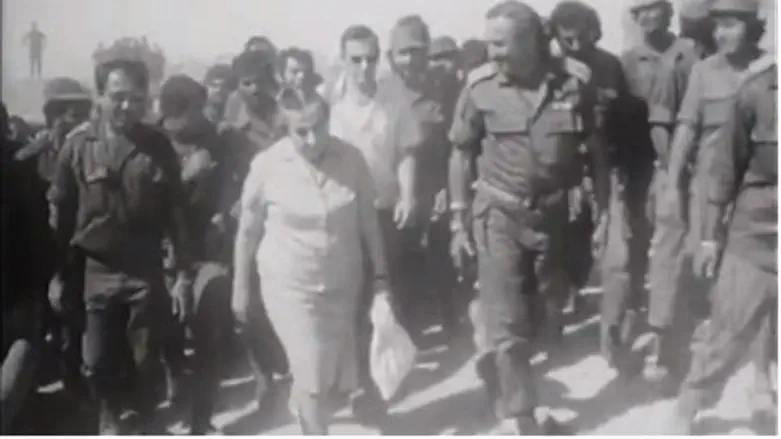
40 years after the Yom Kippur which began on October 6th 1973, defence establishment archives reveal the state of mind of then-Prime Minister Golda Meir in the build up and aftermath of the war.
The Agranat Commission headed by Chief Supreme Court Justice Shimon Agranat was established to investigate the war which started with a massive coordinated attack on Israel from the north and the south by Syrian and Egyptian forces simultaneously. More than 2,500 soldiers were killed in the war.
The report of the commission called for the dismissal of four senior intelligence officers it deemed had exercised poor lack of judgement. Although it cleared Meir of any direct blame she resigned on April 11, 1974, bowing to what she felt was the "will of the people."
In the newly revealed testimony Meir said she was not able to confront the Chief of Staff, and Head of Intelligence during the war who had played down the chances of war breaking out. She added she had especially suffered from her decision not to mobilize and call up the army's reserve troops.
"I think the headline of the disaster that befell us is 'mistakes,' she said. "I'll take myself as an example. People will say what happened was foolish, and to a great extent that is right but at the time, I wasn't able to stand up and confront the head of intelligence or the Chief of Staff. I chastise myself that I didn't say 'gentlemen. Perhaps nevertheless, we should call up the reserves.'"
Meir leveled criticism at then Head of Intelligence Eli Zeira, who she said had not passed on enough intelligence information to government ministers in the lead up to the war, noting in particular that ministers were not informed that Russian advisers had left Syria. She added that since the Six Day War, a sizeable investment had been made to ensure an effective warning system was in place in case of outbreak of war, but "at the end of the day. We didn’t receive a warning."
The Head of the Mossad during the period of the war, Zvi Zamir, also received a dressing-down from Meir at the commission, claiming that Zamir had not informed her of an urgent meeting that had taken place on the eve of the war with Egyptian Agent Ashraf Marwoun. Meir said had she known about Marwoun's warning, she may well have taken that into consideration when making the critical decisions in the build up to the Syrian Egyptian attack.
Meir also told the commission that her decision not to call up and mobilize Israel's reserve forces in response to the mass mobilization of Egyptian and Syrian troops on its borders was caused by a suspicion that acting too soon would have threatened the arrival of essential supplies from the US that would be needed to win the war.
Eventually the reserves were called up on the morning of Yom Kippur War, which began with surprise attack at 2am by Arab forces. Meir was concerned that Israel would be accused of starting the war and would not be able to call on US military aid if the country acted in a provocative way.
Earlier this week, a former Commander in the war, Lt Col. (Res) Avi Gur, urged Israelis to reassess the traditional narrative of the Yom Kippur War as a failure and embrace the military victory and turnaround he lauded as the greatest of the last hundred years.